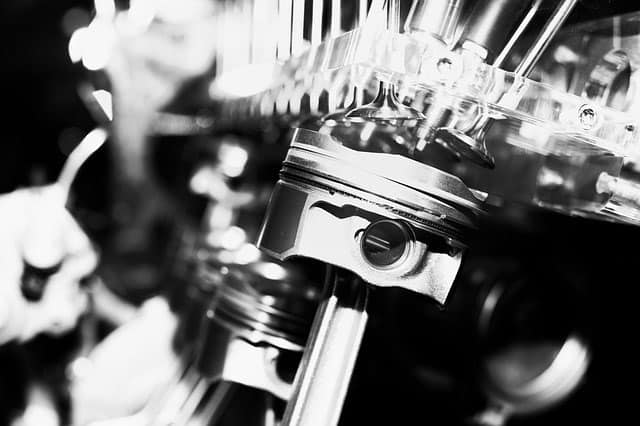Table of Contents
What Does A Hydrolocked Engine Mean?
You probably know that you shouldn’t drive through standing or moving water but what are some of the consequences of doing that? Besides frying the electrical systems of your car water can have devastating effects on your cars engine. A hydrolocked engine is what you get when water is introduced inside of the combustion chamber of your engine.
So what does a hydrolocked engine mean? A hydrolocked engine occurs when water gets inside of the combustion chamber of your engine. As your engines pistons tries to compress the water inside of your engine it meets resistance as water cannot be compressed like air. When this happens the engine must stop rotating or a mechanical failure inside the engine will occur.
That’s why you should never drive through standing water or moving water because you never know how deep the water may be. Depending on how much water was sucked into the engine and how quickly the internals of the engine was moving will determine the damage to your engine. What can you do if you suspect your engine has been hydrolocked?
How Do You Fix A Hydrolocked Engine?
Your engine has become hydrolocked now what? If your engine does become hydrolocked you would need to figure out how much damage occurred to the engine. Once you are able to determine what damage occurred you can begin to look at replacing the different internal parts of your engine that were damaged.
The definition from Wikipedia of hydrolock is “Hydrolock occurs when a volume of liquid greater than the volume of the cylinder at its minimum (end of the piston’s stroke) enters the cylinder. Since liquids are nearly incompressible the piston cannot complete its travel; either the engine must stop rotating or a mechanical failure must occur.”
If your connecting rods became damaged during the hydrolock process then you can replace your connecting rods. However, if your connecting rods broke off and was shot out of the engine block then you likely are going to need to rebuild the engine or replace it with another newer engine.
If you have damage to your engine block you can look at having your engine block repaired but it may be easier to just get another new or used engine block to use. You could also look at getting a used engine from a local junkyard to replace your old engine that is hydrolocked.
What Are Common Causes of A Hydrolocked Engine?
1. Water In Cold Air Intake
If your car has an aftermarket cold air intake attached to the engine your chances for water getting into your engine are going to go up. With cold air intakes they are designed to allow as much air as possible to be able to flow into your air intake of your engine.
Cold air intakes typically don’t have any protection from the outside elements and would allow any water in the engine bay to get sucked into the engine. Cold air intakes are also sometimes put in the wheel wells of cars so that they don’t suck in the hot air in the engine bay.
This means that if you drive into a puddle on the side of the road that water can go into your wheel well and get sucked into your cold air intake which can also hydrolock your engine.
2. Driving Through Water
Driving through a flooded section of road can also be another common reason why engines become hydrolocked. If you drive through water that water can eventually go over the hood of your car. If the water levels reach high enough to go over your air intake on your engine there is good chances that your engine is going to suck water into the air intake.
This is why you should never drive into a flooded section of road because you never really know how deep it is going to be. Even if another car made it across the same section of the flooded road your car may not be as lucky especially if you are lower to the ground in your car.
3. Leaking Gasket
Your engine may have a leaking head gasket that is allowing engine coolant to leak into the cylinders of your engine. If this occurs this can cause your engine to become hydrolocked because the coolant cannot be compressed like air.
There may not be a good way to check if you have a leaking head gasket but what you can do is check your coolant to see if you see any oil in it. If you do see oil in your coolant chances are that you have a leaking head gasket that is allowing oil from your engine to mix with the coolant circulating through your engine.
If you do suspect that you have a leaking head gasket you would want to get that replaced as if enough coolant leaks into your engine cylinder this can cause your engine to hydrolock. Then you may be looking at replacing your engine instead of just replacing your head gasket.
If you have oil in your coolant you may want to read the below article to help you understand what you need to do to get that fixed.
How Do You Prevent Hydrolock?
In order to prevent hydrolock from happening to your engine you would want to make sure that no water or fluids have a chance to enter your engine. If you have a cold air intake attached to your air intake portion of your engine you may want to remove it and go back to your stock air intake to better prevent water from being able to get into your air intake and ultimately into your engine.
If you ever are driving and encounter a flooded road you do not want to attempt to drive through it. Driving through a flooded road can cause your car to be swept away in the flood or could cause water to be able to get into your engine. If the water levels on the road are above the air intake of your engine that water will likely get sucked into your air intake and into your engine cylinders. Any water that gets into your engine cylinders would likely spell disaster for your engine.
You would also want to make sure that you check your engine for any leaks and fix those leaks if they occur. If you ever see a puddle of green fluid under your car after parking it for a while you are likely looking at a coolant leak.
If you do have a coolant leak on your engine you may want to look at replacing your head gasket of your engine as it may be failing. You would first want to make sure that the coolant leak is not coming from a coolant hose before you decide to replace your head gasket as replacing your head gasket is not cheap.
Replacing your head gasket involves tearing down your engine to be able to replace the gasket so it is a time intensive job.
Will A Hydrolocked Engine Turn Over?
If your engine is indeed hydrolocked then it typically will not turn over. When your engine becomes hydrolocked typically the engine will seize up internally or it will cause an internal part like a connecting rod or piston to be broken off inside of the engine. If this happens this can result in complete engine failure.
If your hydrolocked engine will not turn over then you are likely going to need to have your engine rebuilt. Once your engine will no longer turn over it will need to be dismantled to see what caused it to lock up. From there the mechanic can assess what parts cause the engine to seize up and what can be done to salvage the engine.
Can A Blown Head Gasket Cause A Hydrolocked Engine?
A blown head gasket can be another cause of your engine hydrolocking. If your head gasket is not able to separate your engine coolant from your engine cylinders some of that coolant may slip into the cylinder walls. Because the engine coolant is fluid and is not compressible like water it can also cause your engine to hydrolock.
If you suspect that your head gasket is leaking you should get that replaced to keep this from happening to your engine. Replacing your head gasket is not an easy job and will require removing the top half of your engine to get access to remove the head gasket.
In Conclusion
Hydrolocking an engine occurs when water or fluid enters into your engine cylinders. Because your engine is not able to compress the water or fluid this can spell disaster for your engine. If your engine does become hydrolocked you are likely looking at rebuilding or replacing your engine with another one.
Sources

